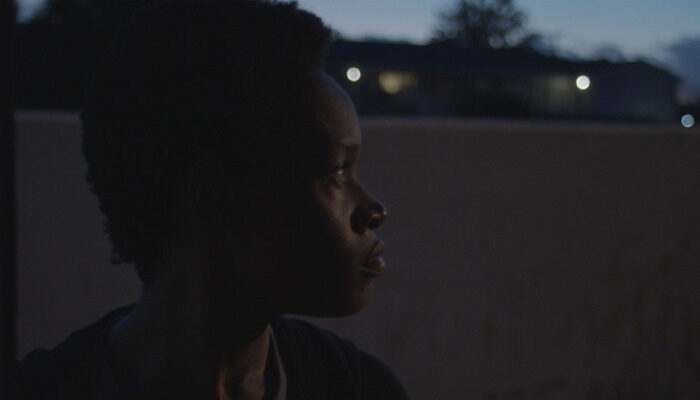Film Review: LINOLEUM: Surreal Symbolism Delivers More on Feeling than Logic [SXSW 2022]
Linoleum Review
Linoleum (2022): Film Review, from the 29th Annual South by Southwest Film Festival, a movie written and directed by Colin West, and starring Jim Gaffigan, Rhea Seehorn, Katelyn Nacon, Gabriel Rush, Amy Hargreaves, West Duchovny, Michael Ian Black, Tony Shalhoub, Elisabeth Henry, and Roger Hendricks Simon.
This film may accurately be described as a three-ring quantum circus of overlapping timelines in the life of a family through the eyes of one man, a kaleidoscope of symbolic melancholy.
Linoleum launches literally with a bang. A blazing red Corvette falls upside-down from the sky onto a suburban street where a middle-aged man, Cameron, stands at his mailbox. Cameron doesn’t hurry to the flattened vehicle. Instead he trudges over timidly, curious rather than shocked or alarmed. The mustachioed driver lay half out of the wreckage with no sign of injury. A perfunctory exchange, and Cameron continues trudging into his ticky-tacky suburban home.
This the first of several outright bizarre incidents that the life of Cameron the family man, clues that his life is not exactly on a steady track.
From that point, however, events unfold, or so it seems, in ways expected for a dysfunctional family in the final throes of disintegration with some notable oddities. His wife and rocket engineer, Erin, seeks a divorce, even though they still sleep together. Their daughter, Nora, a high school student, is deciding whether or not she’s a lesbian. No one takes much notice of the youngest, Sam, about ten years old, who takes almost no notice of them.
Then, another crash landing — a launch module of a satellite in the back yard. The house gets cordoned off and condemned. But Cameron can’t bring himself to stay away and soon returns to the homestead, bringing with him along his demented father at the suggestion of the nursing home where he resides.
Fortunately, Cameron now has plenty of time to realize a lifelong yet unfilled dream of becoming an astronaut. Because unfortunately he lost his job as the host of a failing science show for kids to Kent (the man from the Corvette), a PBS celebrity hired to boost the show’s ratings. Kent now lives across the street with his teenaged son, Marc (whom Nora pretends not to care about), who latches onto Cameron, encouraging him to fix the crashed launch module and explore space anyway.
Director Colin West plays with timelines throughout. He drops into the narrative what the audience takes to be flashbacks, but what is actually Cameron maneuvering through a hall of mirrors of sorts, where the distortions reflect parts of his own experience.
And by the end, the mainstay of the plot device is clear about what West was aiming at — the last moments of Cameron’s life as he looks back, with his regrets and exultations. (At least this reviewer’s take on it.) What started as painfully melancholic becomes exquisitely nostalgic. Thus: Cameron begins with a series of losses: his job to Kent, his marriage to a divorce, his home to a freak accident. He sees himself as 10-year-old Sam, the son of the impossibly demanding, abusive Kent, who later tries to run down his son Marc for disobeying, but dying himself, crashing his Corvette.
Then there is Erin years before the divorce, co-hosting Cameron’s kids show and obviously loving every minute of it, and finally chooses him over a prestigious job. Together they fix the rocket, together they blast off, Cameron as the demented father with co-host co-pilot Erin at his side.
It’s tricky, but West tries his best to pull no sucker-punches while steeping the film in symbolic surrealism. He somehow manages to avoid a convoluted plot and pulls it about as tight as it can be, and the result is very clever. It can’t exactly be called dream logic, however, grounded as it is in the alternate, more substantial narratives, bolstered by first-rate performances all around that give it ‘real-world’ strength and substance. It does, however, provide a nice balanced contrast.
Occasionally there are a few peculiar logistical issues that may provoke further discussion, i.e., leaving to experts the notion of an Electra complex when Marc marries Nora. At the end of the day, Linoleum finds its real strength in emotional terms, and one finds it remarkably satisfying.
Rating: 8/10
Leave your thoughts on this Linoleum review and the film below in the comments section. Readers seeking to support this type of content can visit our Patreon Page and become one of FilmBook’s patrons. Readers seeking more South by Southwest Film Festival news can visit our South by Southwest Film Festival Page, our Film Festival Page, and our Film Festival Facebook Page. Readers seeking more film reviews can visit our Movie Review Page, our Movie Review Twitter Page, and our Movie Review Facebook Page.
Want up-to-the-minute notifications? FilmBook staff members publish articles by Email, Twitter, Facebook, Instagram, Tumblr, Pinterest, Reddit, and Flipboard.
Related Articles
FilmBook's Newsletter
Subscribe to FilmBook’s Daily Newsletter for the latest news!













